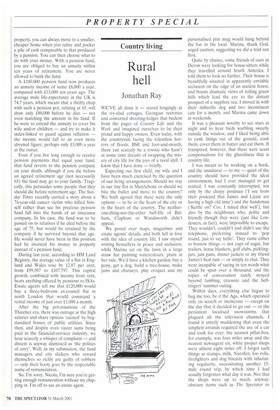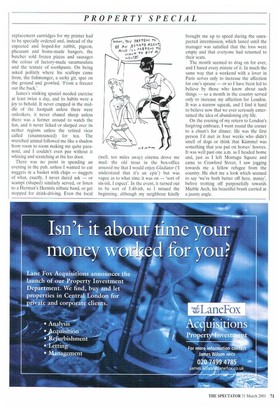Rural hell
Jonathan Ray
property, you can always move to a smaller, cheaper home when you retire and pocket a pile of cash comparable to that produced by a pension. You can then choose what to do with your money. With a pension fund, you are obliged to buy an annuity within ten years of retirement. You are never allowed to bank the fund.
A £100,000 pension fund now produces an annuity income of some £8,000 a year, compared with £13,000 ten years ago. The average male life-expectancy in the UK is 74.7 years, which means that a thrifty chap with such a pension pot, retiring at 65, will draw only £80,000 before he dies — not even matching the amount in his fund. If he were to extend the annuity to cover his wife and/or children — and try to make it index-linked to guard against inflation — the income would fall to an even more abysmal figure: perhaps only £3,000 a year at the outset.
Even if you live long enough to receive pension payments that equal your fund, that fund reverts to the pension company on your death, although if you die before an agreed retirement age (not necessarily 65) the fund may go to your family. Tragically, this persuades some people that they should die before retirement age. The Sunday Times recently carried a story about a 74-year-old cancer victim who killed himself rather than see his precious pension fund fall into the hands of an insurance company. In his case, the fund was to be passed on to relatives if he died before the age of 75, but would be retained by the company if he survived beyond that age. He would never have been in this position had he invested his money in property instead of a pension fund.
During last year, according to HM Land Registry, the average value of a flat in England and Wales rose by 12.87 per cent, from £99,507 to £107,797. This capital growth, combined with income from rent, beats anything offered by pensions or ISAs. Estate agents tell me that £120,000 would buy a three-bedroom ex-council flat in north London that would command a rental income of just over £1,000 a month.
After the big privatisations of the Thatcher era, there was outrage at the high salaries and share options 'earned' by bogstandard bosses of public utilities. Since then, and despite even vaster sums being paid in the financial-services industry, we hear scarcely a whisper of complaint — and dissent is anyway dismissed as 'the politics of envy'. Well, in my submission, the fund managers and city slickers who reward themselves so richly are guilty of robbery — only their booty goes by the respectable name of remuneration.
So. I'm sorry, Nicola, I'm sure you're getting enough remuneration without my chipping in. I'm off to see an estate agent. WE'VE all done it — stared longingly at the ivy-clad cottages, Georgian rectories and converted shooting-lodges that beckon from the pages of Country' Life and the Week and imagined ourselves to be their proud and happy owners. Even today, with the countryside facing the relentless horrors of floods, BSE and foot-and-mouth, there can scarcely be a townie who hasn't at some time dreamt of swapping the misery of city life for the joys of a rural idyll. I know that I have done — briefly.
Expecting our first child, my wife and I have been much exercised by the question of our living arrangements. Should we stay in our tiny flat in Marylebone or should we bite the bullet and move to the country? We both agreed that these were the only options — to be in the heart of the city or in the heart of the country. The neitherone-thing-nor-the-other half-life of Balham, Clapham or Wandsworth didn't appeal.
We pored over maps, magazines and estate agents' details, and both fell in love with the idea of country life. I saw myself writing bestsellers in peace and seclusion, while Marina sat on the lawn in a large straw hat painting watercolours, pram at her side. We'd have a kitchen garden, buy a pony, get a dog, build a tree-house, make jams and chutneys, play croquet and my personalised pint mug would hang behind the bar in the local, Marina, thank God, urged caution, suggesting we did a trial run first.
Quite by chance, some friends of ours in Devon were looking for house-sitters while they travelled around South America. I told them to look no further. Their house is beautifully situated in apparently enviable seclusion on the edge of an ancient forest, and boasts dramatic views of rolling green hills which lead the eye to the distant prospect of a sapphire sea_ I moved in with their imbecilic dog and two incontinent cats for a month, and Marina came down at weekends.
It was a pleasant novelty to see stars at night and to hear birds warbling sweetly outside the window, and I liked being able to yank things out of the ground, cook them, cover them in butter and eat them. It transpired, however, that these were scant compensations for the ghastliness that is country life.
I was meant to be working on a book, and the unnatural — to me — quiet of the country should have provided the ideal environment, had I ever managed to get started. I was constantly interrupted, not only by the chirpy postman CI see from their postcard that James and Lizzie are having a high old time') and the handyman (Kettle on? Cor, I timed that well'), but also by the neighbours who, polite and friendly though they were (just like Londoners, in fact), were impossible to escape. They wouldn't, couldn't and didn't use the telephone, preferring instead to pop round, just to say hello'. They came either to borrow things — not cups of sugar, but trailers, horse blankets, golf clubs, picklingjars, jam pans, dinner jackets or my friend James's best ram — or simply to chat. They were incapable of saying in ten words what could be spun over a thousand, and the topics of conversation rarely strayed beyond lambing, creosote and the bellringers' summer outing.
Within days, everything else began to bug me too, be it the Aga, which operated only on scorch or incinerate — except on the day that it decided to go out — or the persistent localised snowstorms that plagued all the television channels. I found it utterly maddening that even the simplest errands required the use of a car and took for ever: the nearest pillar-box, for example, was four miles away and the nearest newsagent six, while proper shops were almost eight miles off. I forgot such things as stamps, milk, Nurofen, loo rolls, firelighters and dog biscuits with infuriating regularity, necessitating another 15mile round trip, by which time I had usually forgotten what day it was. Not that the shops were up to much, anyway: obscure items such as The Spectator or replacement cartridges for my printer had to be specially ordered and, instead of the expected and hoped-for rabbit, pigeon, pheasant and home-made bangers, the butcher sold frozen pizzas and sausages the colour of factory-made taramasalata and the texture of toothpaste. On being asked politely where his scallops came from, the fishmonger, a sarky git, spat on the ground and growled, 'From a freezer out the back.'
James's stinking spaniel needed exercise at least twice a day, and its habits were a joy to behold. It never crapped in the middle of the footpath unless there were onlookers, it never chased sheep unless there was a farmer around to watch the fun, and it never licked or slurped over its nether regions unless the retired vicar called (unannounced) for tea. The wretched animal followed me like a shadow from room to room making me quite paranoid, and I couldn't even pee without it whining and scratching at the loo door.
There was no point in spending an evening in the pub, unless I wanted to eat nuggets in a basket with chips — nuggets of what, exactly, I never dared ask — or scampi (shaped) similarly served, or listen to a Herman's Hermits tribute band, or get stopped for drink-driving. Even the local (well, ten miles away) cinema drove me mad: the old trout in the box-office assured me that I would enjoy Gladiator (`I understand that it's an epic') but was vague as to what time it was on — 'sort of six-ish, I expect'. In the event, it turned out to be sort of 5.40-ish, so I missed the beginning, although my neighbour kindly brought me up to speed during the unexpected intermission, which lasted until the manager was satisfied that the loos were empty and that everyone had returned to their seats.
The month seemed to drag on for ever, and I hated every minute of it. In much the same way that a weekend with a lover in Paris serves only to increase the affection for one's spouse — or so I have been led to believe by those who know about such things — so a month in the country served only to increase my affection for London. It was a narrow squeak, and I find it hard to believe now that we ever seriously entertained the idea of abandoning city life.
On the evening of my return to London's forgiving embrace, I went round the corner to a chum's for dinner. He was the first person I'd met in four weeks who didn't smell of dogs or think that Kiimmel was something that you put on horses' hooves. It was well past one a.m. as I headed home and, just as I left Montagu Square and came to Crawford Street, I saw jogging towards me a fellow refugee from the country. He shot me a look which seemed to say 'we're both better off here, matey', before trotting off purposefully towards Marble Arch, his beautiful brush carried at a jaunty angle.



























































































 Previous page
Previous page